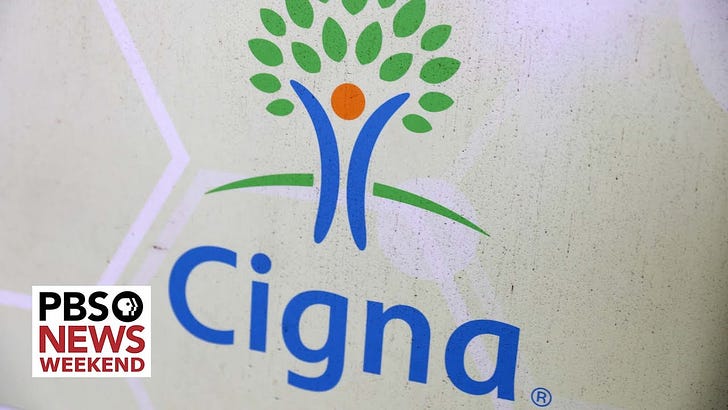This post goes out to both free and paid subscribers, but if you are not already a paid subscriber and value this effort and our growing community, please consider upgrading to a paid membership.
By the way, a few days ago, I cross-posted to my subscribers an invigorating discussion I had with Carrie Lou Hamilton, author of the really cool Substack newsletter, Pen In Fist, but I understand that this cross-post did not reach all of my subscribers. There is both a podcast and transcription, so you can enjoy it both ways! Have a listen and/or a read here: “I Saw That Stories Could Have An Impact”. A huge thank you to Carrie for our fun and enlightening discussion!
PBS News, May 28, 2023
“ProPublica’s investigation [of health insurance company, Cigna], published in March [2023], found that an automated system, called PXDX, allowed Cigna medical reviewers to sign off on 50 charts in 10 seconds, presumably without examining the patients’ records. Decades ago, insurers’ reviews were reserved for a tiny fraction of expensive treatments to make sure providers were not ordering with an eye on profit instead of patient needs. These reviews — and the denials — have now trickled down to the most mundane medical interventions and needs, including things such as asthma inhalers or the heart medicine that a patient has been on for months or years.” PBS News
Earlier this year, I wrote about an infuriating number of health care denials specifically issued to those covered by Medicaid, as if the insurance companies were choosing to deny claims to those who were unlikely to have the time or resources to mount successful appeals. And this trend has continued to make the news, with a broader investigation by ProPublica and statistics gathered by the Kaiser Family Foundation (KFF) in 2023. ProPublica has published a series of articles on the topic of health care claim denials just in November, in addition to the PBS piece shown above, and others. And I think they’re worth reviewing here because everyone who has health insurance can be denied payment for treatment, which can cause additional medical issues, medical debt and even death.
Private, for-profit health insurance companies are getting away with a record number of claim denials — many issued with no clear reason or evidence provided for the denial — which the insured needs to file a proper appeal. This increase is in part, attributable to lax government oversight and an incredibly low number of appeals from customers, according to the ProPublic report. For example, less than 0.2% of people with health insurance purchased from the ACA Exchange in 2021, whose claim for medical coverage was denied, appealed the denials. And of that minuscule number of appeals, the insurers upheld 59% of the original denials.
When a claimant files an appeal of any kind through a private company or government process, it is arduous and time-consuming, and often involves gathering evidence, transferring that evidence to upload-able formats and completing complicated forms…and then the waiting for a decision begins. But with medical claims, it is likely that the patient simply cannot pay for the procedure and either doesn’t receive what could be life-saving treatment, charges the cost on high interest credit-cards and/or borrows from family and friends and accumulates medical debt in one form or another as millions of Americans do everyday.
The recent increase in health insurance claim denials, particularly the “robo-signing” of en-masse denials as discussed in the PBS video above, is really part of a larger pattern of how big business, that have oodles of money and power with regulators, shape their business practices. Not only do industries as diverse as health insurers, banks and environmental polluters (the chemical industry or product manufacturers, for example), cut corners in their processes and coverage to increase their profits, but many times — and I have first-hand experience with mortgage and manufacturing industries—build in noncompliance as a cost of doing business. They choose to ignore certain laws, and if caught, pay a penalty (which their lawyers negotiate to as little as possible), and then go back to, well, ignoring laws that are cheaper to violate than comply with. Think the illegal robo-signing of house foreclosures nearly all of the major banks used during the financial crisis, for which they were later convicted and fined.
One article in the recent ProPublica series is aptly titled: “When Health Insurers Break State Laws”. It details a pattern of certain medical insurers who had routinely disregarded state law, and in one case used as a particularly vivid example, Aetna denied health insurance coverage for certain procedures necessary during childbirth and required to be covered by Maine state law. Oddly, these denials were issued to the same woman two times, separated by several years, for the birth of her two children…and she filed complaints to the state insurance agency for both. Here’s what happened after the second complaint was filed.
Regulators discovered that the insurer [Aetna] had miscalculated claims related to more than 1,000 births over a four-year period. Aetna issued refunds totaling $1.6 million and agreed to pay a $150,000 fine if it failed to follow conditions listed in a consent agreement. It was a rare victory. The potential fine, though, constituted less than .002% of the $6.63 billion in profit recorded by Aetna’s parent company, CVS Health, that year.
There are numerous egregious cases highlighted through this investigation, but when a person denied medical treatment dies while still fighting for coverage, it is particularly cruel. And when insurance executives purposefully collaborate to deny treatment by circumventing state law with semantics, denials of coverage reach a new low. According to one of the executives no longer working for the insurer in question, Priority Health: “We crossed the line”.
What executives at Priority Health did was try to avoid a costly payment that was otherwise required by Michigan state law, that mandated coverage of all clinically approved “cancer treatment drugs”. What the doctor ordered for Forrest VanPatten, stricken with an aggressive form of lymphoma, was an FDA approved gene therapy called CAR T-Cell treatment, that Medicare had already approved and had successfully used to treat its patients. The executives decided to specifically exclude “gene therapy” from coverage in their policies because it was not technically a “drug”.
Knowing it could take weeks to grow the cells used in the treatment, his [Vanpatten’s] doctors prepared to extract his white blood cells. “These are diseases where we don’t have a lot of time to waste,” Williams [VanPatten’s doctor] said. …Then Williams’ office found out that Priority Health had denied the request. Forrest’s doctors appealed but were turned down again… The VanPattens didn’t have the money to pay out of pocket, and Forrest didn’t want to saddle his family with medical debt. His medical team filed a third and final appeal, this one to an independent reviewer.
Forrest VanPatten died waiting for a decision on his third appeal.
Medical insurers are equal opportunity deniers, though, and in another case investigated by ProPublica, an attorney nationally known for his litigation skills, Robert Salim, was denied life-saving treatment (targeted Proton therapy) for “Stage 4 throat cancer that had spread to his lymph nodes.” The insurer was Blue-Cross and Blue Shield of Louisiana and they denied his initial claim and appeals, saying the doctor had to try other procedures first and that the recommended Proton therapy “was not medically necessary”.
After hearing the grotesque possible side effects of the alternative treatments, Salim paid the $96,000 out-of-pocket for the recommended Proton treatment and along with an attorney friend, decided to sue Blue Cross and Blue Shield, Louisiana’s largest insurer, in court. Four years later, after several appeals, Salim won. More importantly, he was alive to receive the verdict. Blue Cross and Blue Shield is now fighting the dollar amount it is required to compensate Salim, although the insurer has undoubtedly spent many times more in litigation than if they had just paid the claim upfront.
Here are a few extra resources provided by ProPublica, the Juvenile Diabetes Research Foundation (JDRF), and the federal government for those struggling with medical care denials:
— “It’s Your Right To Know Why A Health Insurer Denied Your Claim”, ProBublica;
— “Denials and Appeals: What to Do When Your Insurance Company Denies You Coverage”, JDRF; and
— “How to Appeal An Insurance Company Decision” HealthCare.gov
___________________________________________________________________________
Have you, or your friends or family been denied health insurance coverage? Did you appeal? Pay for the recommended treatment yourself? Go without treatment? I’d love to hear your thoughts on this issue that affects us all—please leave a comment below!
Please consider supporting The Poverty Trap with a free or paid subscription. Your financial support will allow me to continue writing this newsletter and expanding it with primary source statistics and podcast interviews. Thank you in advance for your financial support of my writing!












Share this post